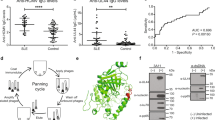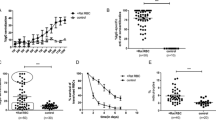Abstract
Patients with the acquired immune deficiency syndrome (AIDS) and AIDS-related conditons are known to have abnormalities of T cell subpopulations, including a decreased helper/inducer (bearing the CD4 antigen) to suppressor/cytotoxic (bearing the CDS antigen) T cell ratio and decreased absolute numbers of T cells with the CD4+ phenotype1,2. Infection of T cells with a retrovirus, termed human immunodeficiency virus (HIV), is thought to be important in these abnormalities3–5. HIV infection alone does not adequately explain the CD4+ T-cell abnormalities seen in AIDS, however, and the nature of T-cell destruction in this disease remains poorly characterized6. Here we describe an AIDS-related serum autoantibody that reacts with an antigen of relative molecular mass 18,000 (Mr 18K) restricted to lectin-stimulated or HIV-infected CD4+ T cells. The antibody also suppresses proliferation of CD4+ T cells in vitro and induces cytotoxicity of these cells in the presence of complement. Its role in the development of AIDS merits attention.
This is a preview of subscription content, access via your institution
Access options
Subscribe to this journal
Receive 51 print issues and online access
$199.00 per year
only $3.90 per issue
Buy this article
- Purchase on Springer Link
- Instant access to full article PDF
Prices may be subject to local taxes which are calculated during checkout
Similar content being viewed by others
References
1. Fauci, A. S. et al. Ann. int. Med. 100, 92–106 (1984).
2. Ammann, A. J. et al. Clin. Immun. Immunopath. 27, 315–325 (1983).
3. Levy, J. A. et al. Science 225, 840–842 (1984).
4. Barre–Sinoussi, F. et al. Science 220, 868–817 (1983).
5. Gallo, R. et al Science 224, 500–502 (1984).
6. Quinnan, G. V. el al. Ann. int. Med. 103, 710–714 (1985).
7. Stricker, R. B., Abrams, D. I., Corash, L. & Shuman, M. A. N. Eng. J. Med. 313, 1375–1380 (1985).
8. Bloom, E. J., Abrams, D. I. & Rodgers, G. M. 256, 491–493 (1986).
9. Cohen, A. J., Philips, T. M. & Kessler, C. M. Ann. int. Med. 104, 175–180 (1986).
10. Toy, P. T. C. Y., Reid, M. E. & Burns, M. Am. J. Hematol. 19, 145–150 (1985).
11. Lane, H. C., Masur, H., Edgar, L. C., Whalen, G. & Fauci, A. S. N. Eng. J. Med. 309, 453–459 (1983).
12. Dalakas, M. C., Pezeshkpour, G. .H., Gravell, M. & Sever, J. L. / Am. Med. Ass. 26, 2381–2383 (1986).
13. Kiprov, D. D. et al. Acquired Immune Deficiency Syndrome, (eds Gottlieb, M. S. & Groopman, J. E.) 299–308 (New York, 1984).
14. Kloster, B. E., Tomar, R. H. & Spira, T. J. 30, 330–335 Clin. Immun. Immunopath. 30, 330–335 (1984).
15. Pruzanski, E., Jacobs, H. & Laing, L. P. AIDS Res. 1, 211–220 (1984).
16. Williams, R. C., Masur, H. & Spira, T. J. J. din. Immun. 4, 118–123 (1984).
17. Tomar, R. H., John, P. A., Hennig, A. K. & Kloster, B. Clin. Immun. Immunopath. 37, 37–47 (1985).
18. Dorsett, B., Cronin, W., Chuma, V. & lochaim, H. Am. J. Med. 78, 621–626 (1985).
19. Stites, D. P. et al. Clin. Immun. Immunopath. 38, 161–177 (1986).
20. Belisto, D. V., Sanchez, M. R., Baer, R. L., Valentine, F. & Thorbaecke, G. J. New Engl. J. Med. 310, 1279–1282 (1984).
21. Andrieu, J. M., Even, P. & Venet, A. AIDS Res. 2, 163–174 (1986).
22. Ziegler, J. L. & Stites, D. P. Clin. Immun. Immunopath. 41, 305–314 (1986).
23. Spencer, J., Pugh, S. & Isaacson, P. G. Lancet ii, 983 (1986).
24. Carlson, J. R. et al. J. Am. Med. Ass. 253, 3405–3408 (1985).
25. Selik, R. M., Haverkos, H. W. & Curran, J. W. Am. J. Med. 76, 493–500 (1984).
26. Mann, D. L. et al. J. Immun. 131, 2021–2024 (1983).
27. Klatzmann, D. & Montagnier, L. Nature 319, 10–11 (1986).
28. Billings, P. B., Hoch, S. O., White, P. J., Carson, D. A. & Vaughan, J. H. Proc. natn. Acad. Sci. U.S.A. 80, 7104–7108 (1983).
29. Fujinami, R. S., Oldstone, M. B. A., Wroblewska, Z., Frankel, M. E. & Koprowski, H. Proc. natn. Acad. Sci. U.S.A. 80, 2346–2350 (1983).
30. Walker, E. J., & Jeffrey, P. D. Lancet ii, 605–607 (1986).
31. Wachter, H. et al. Lancet i, 97 (1986).
32. Yarchoan, R., Redfield, R. R. & Broder, S. J. din. Invest. 78, 439–447 (1986).
33. Groenewegen, G., Buurman, W. A., Jeunhomme, G. M. A. A. & van der Linden, C. J. Transplantation 40, 21–25 (1985).
34. Gauchat, J. F., Khandjian, E. W. & Weil, R. Proc. natn. Acad. Sci. U.S.A. 83, 6430–6434 (1986).
35. Andersson, L. C., & Gahmberg, C. G. Blood 52, 57–67 (1978).
36. Stricker, R. B., Wong, D., Saks, R., Corash, L. & Shuman, M. A. J. din. Invest. 76,1274–1278 (1985).
37. Engelman, E. G., Benike, F. C., Grumet, F. C. & Evans, R. J. /. Immun. 127,2124–2128 (1981).
38. Falus, A. et al. Clin. exp. Immun. 47, 103–109 (1982).
39. Stites, D. P., Stobo, J. D. & Wells, J. V.) (eds) Basic and Clinical Immunology (Appleton and Lange, Los Altos, 1987).
40. Levy, J. A. et al. Ann. int. Med. 103, 694–699 (1985).
Author information
Authors and Affiliations
Rights and permissions
About this article
Cite this article
Stricker, R., McHugh, T., Moody, D. et al. An AIDS-related cytotoxic autoantibody reacts with a specific antigen on stimulated CD4+ T cells. Nature 327, 710–713 (1987). https://doi.org/10.1038/327710a0
Received:
Accepted:
Issue Date:
DOI: https://doi.org/10.1038/327710a0
This article is cited by
-
Effect ofl-lysine-α-oxidase on the synthesis of proteins associated with autoimmune pathologies in HIV infection
Bulletin of Experimental Biology and Medicine (1997)
-
Colocalisation of human immunodeficiency virus and human cytomegalovirus infection in brain autopsy tissue from AIDS patients
Irish Journal of Medical Science (1996)
-
Five myths about AIDS that have misdirected research and treatment
Genetica (1995)
-
Semen alloantigens and lymphocytotoxic antibodies in AIDS and ICL
Genetica (1995)
Comments
By submitting a comment you agree to abide by our Terms and Community Guidelines. If you find something abusive or that does not comply with our terms or guidelines please flag it as inappropriate.



